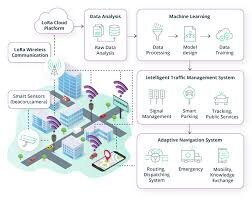Intelligent Traffic Management leverages artificial intelligence (AI) technologies to enhance the control and monitoring of traffic flow, aiming to reduce congestion and improve safety on the roads. By integrating various smart devices and systems, such as traffic management systems and smart traffic signals, cities can create a more efficient transportation network.
AI Technologies in Traffic Management
Real-time Traffic Monitoring and Analysis
AI systems utilize real-time data from multiple sources, including sensors, cameras, and connected vehicles, to monitor traffic conditions. This data allows for:
-
Traffic Flow Prediction: AI models analyze historical and current traffic data to identify patterns and forecast future conditions. This predictive analysis aids in resource allocation and optimizing routes, which helps mitigate congestion[1][3].
-
Incident Detection and Management: AI can swiftly identify traffic incidents such as accidents or road blockages. Upon detection, the system can alert authorities and reroute traffic, ensuring a timely response to emergencies[1][2].
Adaptive Traffic Signal Control
Traditional traffic signals operate on fixed schedules, which can lead to inefficiencies during unexpected traffic surges. AI-driven adaptive traffic signals adjust their timing based on real-time demand, prioritizing high-traffic routes and thus improving overall traffic flow and reducing delays[1][4].
Smart Traffic Management Systems
Several AI-based solutions are transforming traffic management:
-
Intelligent Traffic Management System (IMTS): This system analyzes data from traffic cameras to identify rule violations, such as speeding or running red lights, allowing for automated ticketing and improved compliance among drivers[4].
-
Artificial Intelligence Monitoring System (AIMS): AIMS monitors vehicle speed, type, and traffic density at intersections, enabling proactive measures to prevent congestion and enhance road safety[4].
-
Predictive Maintenance: AI also plays a role in monitoring the health of transportation infrastructure, predicting maintenance needs before issues arise, which helps prevent accidents and service disruptions[3].
Benefits of AI in Traffic Management
The integration of AI in traffic management systems offers numerous advantages:
-
Enhanced Safety: By reducing response times to incidents and improving compliance with traffic laws, AI contributes to safer road conditions[3][5].
-
Reduced Congestion: Efficient traffic flow management minimizes delays, leading to shorter travel times and decreased vehicle emissions, thereby benefiting the environment[2][4].
-
Improved Resource Allocation: Real-time data analysis allows for better deployment of resources, ensuring that traffic personnel are where they are most needed during peak times or emergencies[1][3].
In conclusion, intelligent traffic management powered by AI technologies is revolutionizing how cities handle traffic flow and safety. By utilizing advanced data analytics and adaptive systems, urban areas can significantly enhance their transportation networks, making them safer and more efficient for all users.
Further Reading
1. AI in Traffic Management | Isarsoft
2. AI in Traffic Management: Artificial Intelligence solves traffic control issues
3. Avoiding bumps in the road when designing AI-powered traffic management systems – American City and County
4. https://mkai.org/top-five-ai-based-smart-traffic-management-solutions/
5. The Role of Artificial Intelligence in Revolutionizing Road Safety | Yunex Traffic


